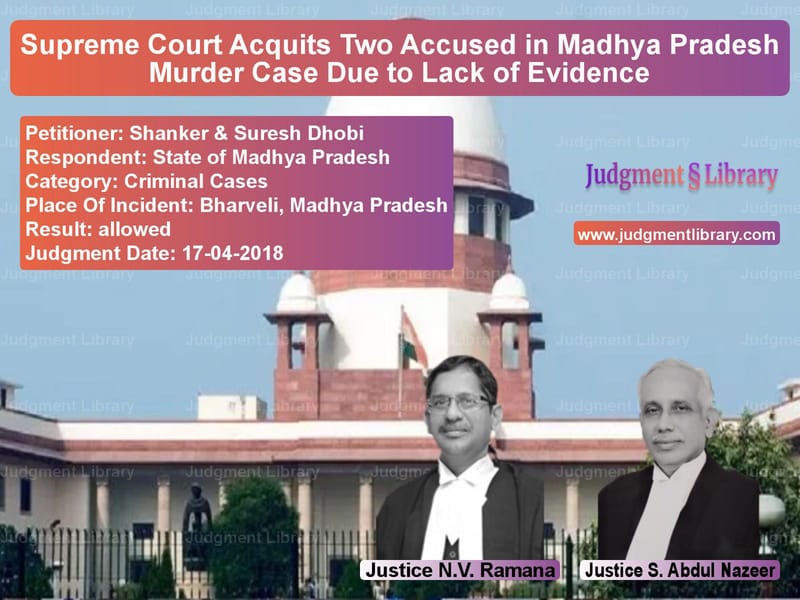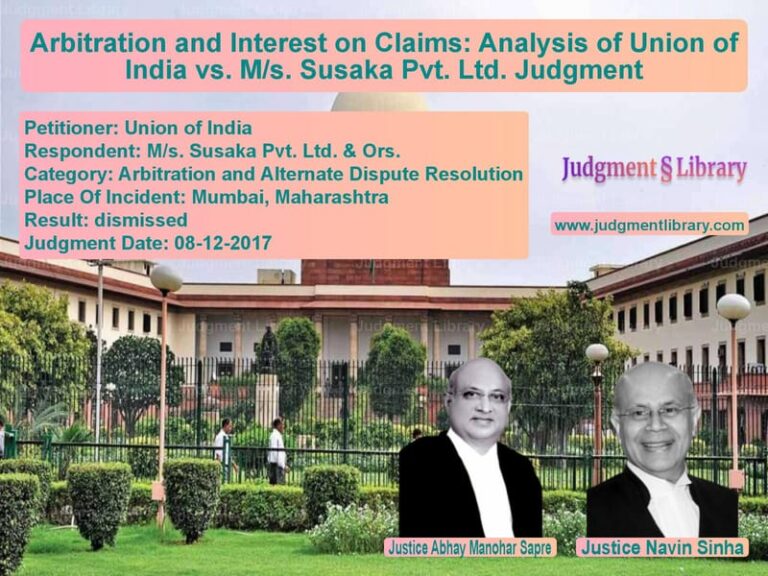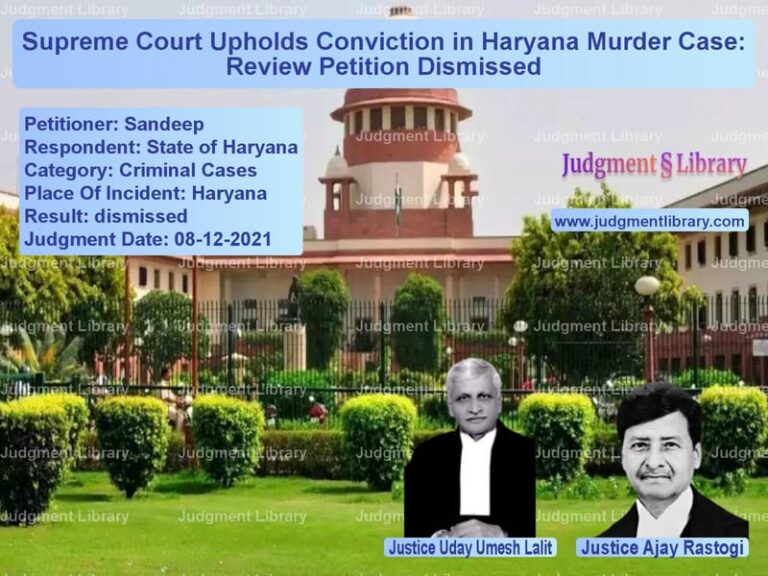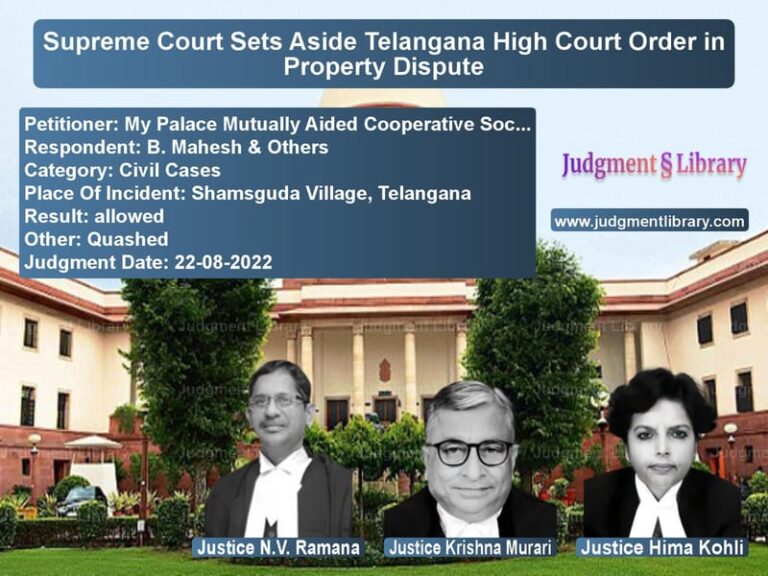Supreme Court Acquits Two Accused in Madhya Pradesh Murder Case Due to Lack of Evidence
The Supreme Court of India recently delivered a significant judgment in the case of Shanker & Suresh Dhobi v. State of Madhya Pradesh. This case revolved around the murder of Sanjay Sorle, who was allegedly assaulted by a group of individuals during a wedding function. The appellants, Shanker and Suresh Dhobi, were accused of being part of the group that attacked the deceased. The trial court and the Madhya Pradesh High Court had convicted the accused under Sections 148 and 302 read with 149 of the Indian Penal Code (IPC). However, the Supreme Court overturned their conviction, ruling that there was insufficient evidence to prove their guilt beyond a reasonable doubt.
Background of the Case
On May 8, 1998, Sanjay Sorle attended a wedding in Bharveli village, Madhya Pradesh. During the wedding, an altercation broke out between Sanjay and some motorcyclists, including an individual named Deepak. Following this, Deepak and others returned to the wedding at around 10:30 p.m. with more accomplices, including Gudda @ Shivshanker, Shiv, Suresh, and Shanker. The prosecution alleged that they took Sanjay outside the wedding venue and assaulted him.
According to the FIR, Gudda inflicted knife injuries, Shiv used a gupti (a sharp weapon), while Shanker and Suresh allegedly attacked the deceased with fist blows. The injured Sanjay was taken to the police station, where an FIR was lodged, and he was sent to the district hospital. Unfortunately, he was declared dead upon arrival.
Prosecution’s Arguments
- The prosecution argued that Sanjay Sorle was murdered in a pre-planned manner.
- Multiple accused individuals participated in the assault.
- The statements of key eyewitnesses, Ganesh Prasad (PW1) and Savitri Bai (PW5), implicated the accused.
- The accused should be held liable under Section 302 read with 149 IPC, which deals with unlawful assembly committing murder.
Defense’s Arguments
- The defense contended that there were multiple contradictions in the prosecution’s case.
- The prosecution witnesses were unreliable, as their statements did not corroborate each other.
- The forensic evidence did not support the allegation that the accused caused fatal injuries.
- No independent witness testified to seeing the accused attacking the deceased.
- The accused only gave fist blows, which could not have caused the fatal injuries.
Supreme Court’s Observations
The Supreme Court thoroughly examined the evidence, especially the testimonies of PW1 and PW5, and noted significant discrepancies:
- PW1, Ganesh Prasad, admitted that he only knew the accused by face and was informed about their names by PW5.
- PW5, Savitri Bai, claimed she had seen the assault from a distance but later stated that the crime scene was not visible from where she stood.
- There were contradictions about who filed the FIR. PW1 claimed to have lodged it, whereas PW5 stated that she had done so.
- The post-mortem report revealed injuries caused by sharp weapons, whereas the accused were alleged to have used fists.
- No identification parade was conducted, raising doubts about whether the accused were correctly identified.
Key Legal Findings
- The Court emphasized that the burden of proof lies on the prosecution to establish guilt beyond a reasonable doubt.
- It ruled that mere suspicion is not enough to convict someone under criminal law.
- The inconsistencies in the eyewitness testimonies made it unsafe to rely on them.
- There was no direct evidence linking the accused to the fatal injuries.
Final Judgment
The Supreme Court acquitted the appellants, Shanker and Suresh Dhobi, and set aside their conviction. The Court ruled:
“On the face of the present case, it can be said without any hesitation that the prosecution has miserably failed to prove the alleged offence by adducing cogent and trustworthy evidence.”
The ruling reaffirmed that convictions must be based on credible evidence and that discrepancies in key witness testimonies can significantly impact the prosecution’s case.
Significance of the Judgment
This ruling highlights the importance of:
- Ensuring eyewitness credibility in criminal trials.
- Corroborating forensic evidence with witness statements.
- Providing fair trials where convictions are based on proof beyond reasonable doubt.
The judgment sets a precedent that courts must scrutinize evidence carefully, especially in cases involving serious offenses like murder.
Petitioner Name: Shanker & Suresh Dhobi.Respondent Name: State of Madhya Pradesh.Judgment By: Justice N.V. Ramana, Justice S. Abdul Nazeer.Place Of Incident: Bharveli, Madhya Pradesh.Judgment Date: 17-04-2018.
Don’t miss out on the full details! Download the complete judgment in PDF format below and gain valuable insights instantly!
Download Judgment: Shanker & Suresh Dho vs State of Madhya Prad Supreme Court of India Judgment Dated 17-04-2018.pdf
Direct Downlaod Judgment: Direct downlaod this Judgment
See all petitions in Murder Cases
See all petitions in Bail and Anticipatory Bail
See all petitions in Judgment by N.V. Ramana
See all petitions in Judgment by S. Abdul Nazeer
See all petitions in allowed
See all petitions in supreme court of India judgments April 2018
See all petitions in 2018 judgments
See all posts in Criminal Cases Category
See all allowed petitions in Criminal Cases Category
See all Dismissed petitions in Criminal Cases Category
See all partially allowed petitions in Criminal Cases Category







